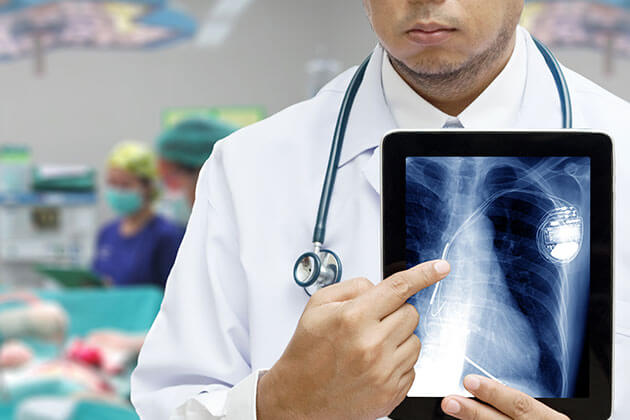

Experiencing fatigue, tiredness, and difficulty breathing due to a slow or irregular heartbeat, Dr. Vinay Jaiswal, a board-certified cardiologist at B&J Hospital in Navi Mumbai, Maharashtra, offers pacemaker treatments to address arrhythmia and enhance your energy levels. To determine if a pacemaker could benefit your heart health, we encourage you to contact B&J Hospital to schedule an appointment or inquire.

A pacemaker is a medical device surgically implanted in the chest to help regulate and control the heartbeat. It comprises several components: a battery, generator, wires, and electrodes. The wires connect the generator to the heart, while the electrodes at the ends of the wires monitor the heart's rhythm. If the rhythm is abnormal or too slow, the generator sends electrical impulses through the wires to stimulate the heart and restore a normal heartbeat.
Pacemakers treat various heart conditions, such as arrhythmias, bradycardia (a slow heart rate), and other rhythm disturbances. A pacemaker can alleviate symptoms like fatigue, breathlessness, and lightheadedness by ensuring that the heart beats at a consistent and appropriate rate. Additionally, pacemakers can store information about the heart's activity, allowing the cardiologist to make necessary adjustments to optimize its functioning and effectively manage the patient's condition.

The decision to implant a pacemaker is based on a thorough evaluation of your medical condition by a qualified healthcare professional, such as a cardiologist. They will consider various factors before recommending a pacemaker.
Some common reasons why a pacemaker may be recommended include:
However, consulting with a cardiologist who can thoroughly evaluate your medical history, perform necessary tests, and provide an accurate diagnosis is important. They can determine if a pacemaker is appropriate for your specific condition.
Living with a pacemaker typically requires adjustments to ensure proper functioning and minimize potential interference. While it is important to consult with your healthcare provider for personalized guidance, here are some general lifestyle considerations for individuals with a pacemaker:
Furthermore, it is crucial to inform all healthcare providers about your pacemaker, including dentists, as certain medical equipment, such as CT scanners or MRI machines, may require special precautions or adjustments to ensure the safe use of the equipment and the pacemaker's integrity.
Contact Dr. Vinay Jaiswal at B & J Hospital in Navi Mumbai for a pacemaker and receive personalized medical advice.